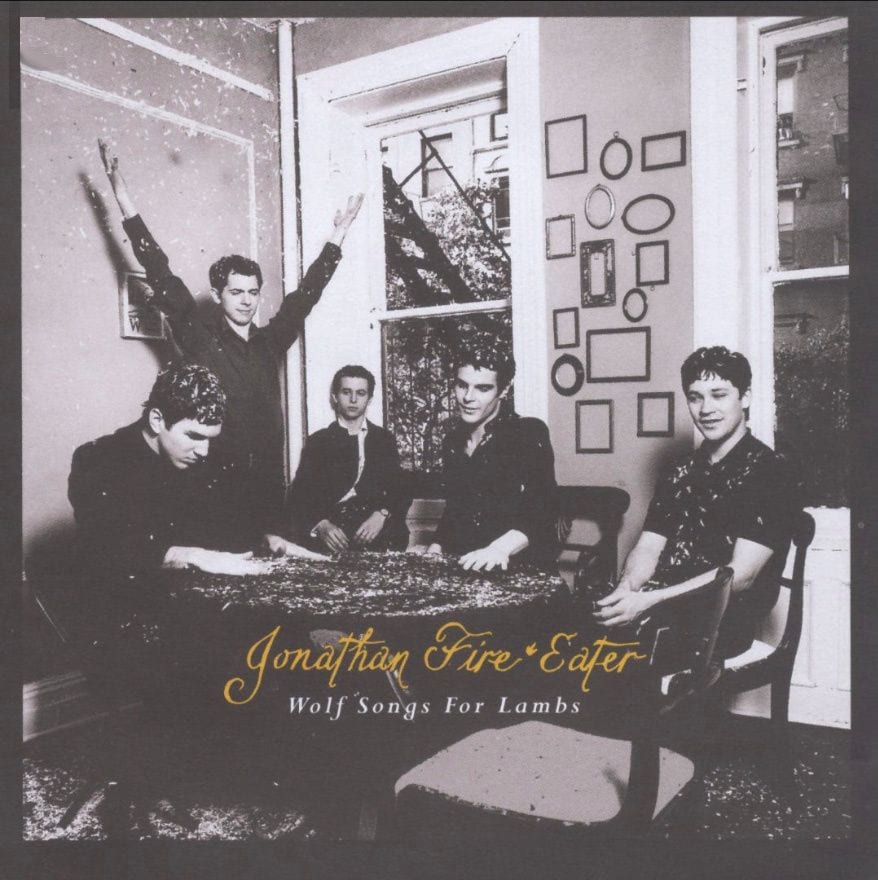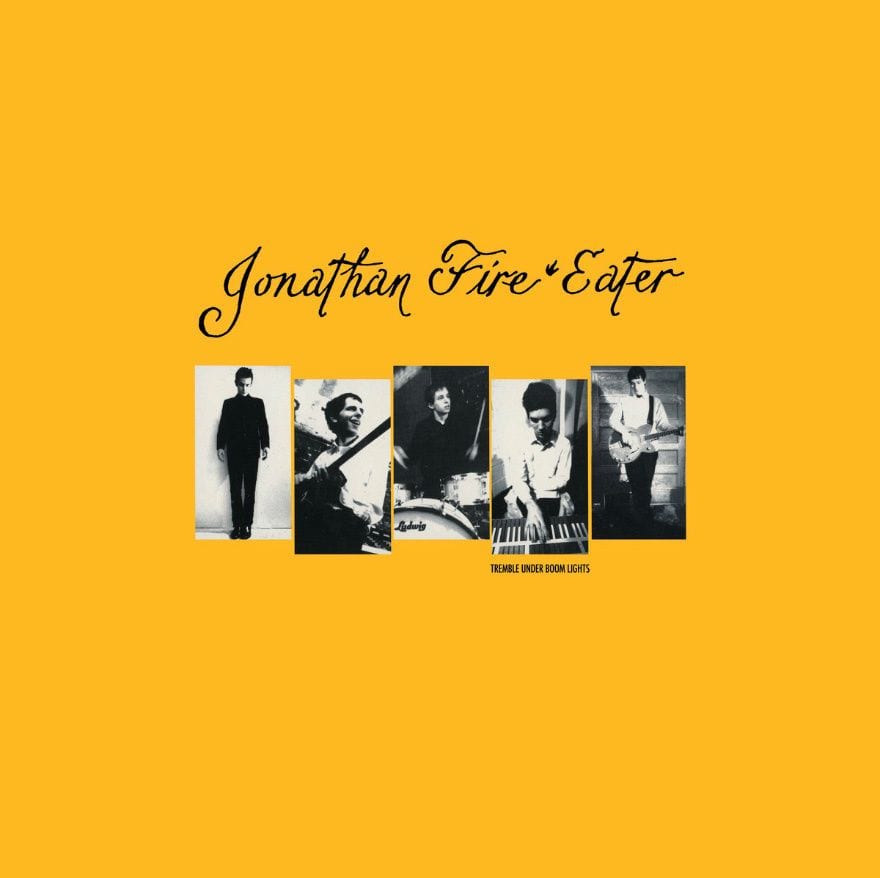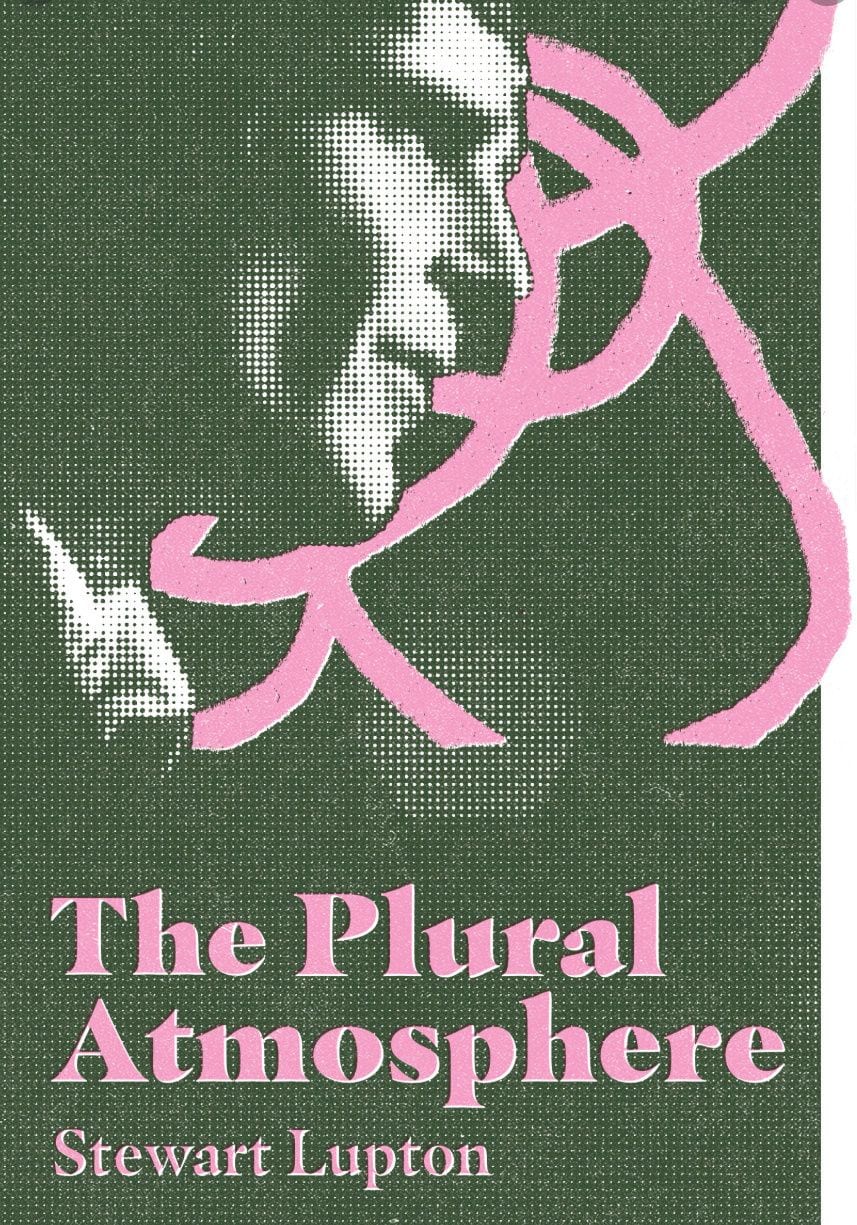
Marshall Amp by tookapic (Pixabay License / Pixabay)
Too early, too eccentric and too volatile to catch the millennial wave of New York garage, the music of Jonathan Fire*Eater sank into analogue oblivion as the last century closed over it. With Third Man’s expanded reissue of their 1996 EP, Tremble Under Boom Lights, a new book of poetry by the band’s late lead singer Stewart Lupton, and the re-release of their final album, Wolf Songs for Lambs, they’re finally in print again, and ripe for reappraisal.
In Meet Me in the Bathroom, her oral history of New York music from 2001 – 2011, Lizzie Goodman puts forth the thesis that the World Trade Center attacks of September 2001 catalysed a miraculous rebirth of rock ‘n’ roll in the city. Returning to the book’s paradigm, Gillian McCain’s Please Kill Me, for the sake of comparison, you’re struck by the frequency of hustling, stabbing, and shooting up in the pages of that classic record of the rise of punk from Warhol’s Factory to CBGBs. Like the poet said, those were different times: the depopulation, crime and bankruptcy of Beame-era New York puts the first decade of the new millennium in the shade, the collective trauma of 9/11 notwithstanding. Inevitably, those higher stakes can be felt in the music, too: from the Velvet Underground to the Dead Boys, there’s a sense of desperate vanguardism in Please Kill Me that’s distinctly absent from Goodman’s book.
But appearing as a false protagonist in the opening chapters of Meet Me in the Bathroom is a band that didn’t make it to the millennium and still exists in a twilit analogue lacuna, beguilingly unavailable, with a slim but astonishing back catalogue, a few electrifying amateur videos of shows that have found their way online, and a handful of publicity images that could have come from the silent age. Possibly the last mythic rock ‘n’ roll group: Jonathan Fire*Eater.
Their rise and fall is traced in Meet Me in the Bathroom with incandescent testimonies from Karen O, Interpol, and others, and some mordant anecdotes from band members and associates. They began playing together at St Albans School, Washington DC, whose alumni include both Gore Vidal and Al Gore, and whose sartorial imprint would remain with the five teenagers when they moved to New York in 1993. Having released a total of two albums and one EP, they burn out five years later amid the kind of acrimony and substance abuse that would be more at home in the pages of Please Kill Me.
Last Spring’s passing of Jonathan Fire*Eater’s singer, Stewart Lupton, coincided with a minor rediscovery of the band as a result of the book and felt like a depressingly predictable postscript. His death brought moving reminiscences from friends and former bandmates, all recounting his charisma, humour, and ungovernable talent. Yet there was only ever a dim sense of what he’d actually achieved in his brief career.
In the paeans gathered by Goodman there’s as much talk of Jonathan Fire*Eater’s tailoring as their sound, and to anyone who hadn’t heard or experienced them, the impression that abides would be of The Band That Could Have Been The Strokes. Reissues of an expanded EP and album, lovingly overseen by Third Man co-founder Ben Blackwell – who’s enough of a Fire*Eater obsessive to have named his blog after one of their records – might correct this misapprehension.
Jonathan Fire*Eater’s first, self-titled album, recorded and released in 1995, barely hinted at the heights they’d reach. Lupton’s mush-mouthed recitations of a grab bag of rock ‘n’ roll iconography atop caustic guitar and organ at times recalls the Birthday Party, Scratch Acid, or the Jesus Lizard. It’s definitely arresting, and the vocabulary is all there: Paul Maroon’s hollow, clanging Gretsch; Walter Martin’s blasting Farfisa and occasional lap steel guitar; Matt Barrick’s roomy, tumbling drums; Tom Frank’s reeling bass; but the syntax is not, quite.
To describe Tremble Under Boom Lights, the EP that followed only a year later, as a refinement, would be to deprecate its raw power. But it represents an extraordinary evolution: the sound of a band that has fully found its direction and sublimed away anything unnecessary. On lead single “Give Me Daughters” a new and thrilling interplay between Maroon’s guitar and Martin’s organ is minted as Lupton snarls in a leering, comic-gothic parody of death disc Thanatos: “If ever this motorcycle goes slip in the mud / Let me have these children to carry down the blood”.
Frank’s bass, too, has taken up position, according equal importance to rhythm and melody, often seeming to sidestep a predictable beat or a root note at the last minute, as though it was something distasteful, and so giving the whole group a weird, lurching swing from the bottom up. He
remembers the song growing out of a poem that Lupton had written, and a joke about how he could count the band back in. Reconfigured as the chorus, “Give me daughters, and make ’em one, two, three!” neatly reconciles two of the traditional motors of rock ‘n’ roll – tumescent libido and Fordist production – in a meta-musical device that’s a worthy successor to the six count at the start of Jonathan Richman’s ‘Roadrunner’.
Opening the EP, ‘The Search for Cherry Red”s tale of daemonic possession in old Hollywood could be a game of exquisite corpse between HP Lovecraft and Nathanael West. It’s also the most coherent voicing, up to this point, of Lupton’s obsessive, ongoing exploration of performance, art and artifice, with the magnificent line “Lipstick trembles under boom lights” yielding the title of the record.
Velvets-y 6ths slither ascendant to usher in ‘Winston Plum, Undertaker’, a ‘character song’ that introduces another of Lupton’s trademarks, the recollection of grotesque tableaux or primal scenes, the kinds of trauma that might traditionally tip a pale child into a great career in art or murder, or maybe in this case, both. The eponymous cold cook’s dutiful approach to his work seems to have been inspired by such an event: “My Great Aunt Cindy / She had an open casket / And I was a-crying ’cause her mouth was all crooked”.
Death is couched as the ultimate performance – something previously contemplated by Lupton on the single, ‘The Public Hanging of a Movie Star’ – and “the hand of an artist” should bring dignity to the occupant of the “casket of the hour”. With its dire warnings of putrefaction, moths in rotten flowers, soured punch, wheedling lap steel and organ vacillating between sacred and profane with a flick of the vibrato switch, it’s morbid, knowing, delirious.

The photograph of the band in their practice room on the back cover of the record is utterly compelling, exactly how you’d imagine the place – a laundry room at Columbia University – where they incubated their wayward sound. Here and in a few other coveted images, such as the picture on the sleeve of their subsequent album, they exude archaic mysteries, calling to mind the malefic cadets in Robert Musil’s Young Törless, or the boys in Sandor Marai’s The Rebels, led by a sinister travelling actor to their doom in a darkened theatre. It was no surprise to read colourful accounts of their shared flat on the Lower East Side among the band’s remembrances of Lupton. It’s all there in the music.
Jonathan Fire*Eater took up the standard garage band instrumentation of bass, drums, guitar and organ, and their sound certainly contains the broken vessels of rock ‘n’ roll, from Richard Berry to ? and the Mysterians, to The Monks and the Velvet Underground. But the way they interact on this record and the album that followed it is singular, instinctive, and social. It’s the sound of five people coming into their majority together, a quincunx that holds each in tension with the others, guarantees the rightness and potency of each move, of each hook, and brings forth its own structures. The instruments relate to one another in new ways; there’s a total internal reflection and any external referents drop away.
This group mind puts Jonathan Fire*Eater way beyond the successive, successful bands in Goodman’s book, whose rote borrowings of the textures and the looks of more obvious NY/CBGBs totems come across as reductive and collagist by comparison. Their extraordinary sound somehow takes them back to their sources, and beyond.
On Tremble Under Boom Lights and their next and final record, the band’s deliberately limited but potently orchestrated sonic vocabulary of wheezing tremolo, hollow clangs, shrill blasts, resonant thuds, and waves of reverb, manages to evoke trains, sirens, churches and cathedrals, hotel lounges, Night and the City, dawn, Hollywood Babylon, the nursery, the prom. Strangely enough it’s a sound world best described almost a century before by the laureate of nocturnal, dissolute New York, Hart Crane: ‘Fog-insulated noises: Gongs in white surplices, beshrouded wails… signals dispersed in veils’. It provides the perfect vehicle for Lupton’s storytelling, which in its sudden maturity seems to take in the murder ballads and tall tales of The Anthology of American Folk Music, Edwardian crimes, surrealism, middle-European literature, film noir, and in general the more extravagantly poisonous effluvia of the 20th century.

The new reissue from Third Man Records sees Tremble Under Boom Lights swollen to LP length with the addition of three more songs (including ‘The Public Hanging of a Movie Star’) from the year preceding its original release. Following these, ‘In the Head’, reportedly the last track the band ever recorded, closes the record. A prospect that had Jonathan Fire*Eater’s dwindling corps of candle-carrying acolytes wide-eyed and white-knuckled, this first ‘new’ material from the band in 22 years is welcome, even if it doesn’t feel quite finished. There’s a taunting sense of transition, with a hint of the broader-strokes chordal approach from Maroon and Martin that would be heard later in the Walkmen’s ‘Wake Up’ and – in extremis – ‘The Rat’. ‘In the Head’ also sits well alongside the more abrasive earlier material, with the singer on wonderfully slovenly form, and the vintage Lupton formulation of an ‘ice-cream truck’ that ‘goes cluck like a chicken’ among the few intelligible lines.
In fact, the way this reissue hangs together, the continuity in the band’s themes and approach in the last two or three years of its existence, reinforces the sense of Jonathan Fire*Eater as a kaleidoscopic, aberrant republic that exists beyond the temporal and the spatial, in which the Orpheus myth is played out in occupied France (‘The Beautician’), a gorilla escapes from the city zoo into a song (‘The Public Hanging of a Movie Star’) and “the perfect crime is to change the world” (‘The Cakewalk of Crime’).
Tremble Under Boom Lights helped fuel a desperate bidding war whose machinations and courtships seem virtually Arthurian today. Jonathan Fire*Eater became one of the first signings to DreamWorks Records, the ill-fated subsidiary of Steven Spielberg’s production company. Their sole LP for the label would be their final one, Wolf Songs for Lambs – released as another Third Man reissue for this year’s recent Black Friday. Although it wasn’t helped by the hype, the stories of their comic prima donna demands and Lupton’s increasing unreliability, the album more than pays off on the promise heard on Tremble Under Boom Lights, with the singer’s deft and witty scene painting reaching new heights on top of – or rather, within – the band’s detailed, brilliantly scored racket.
‘When the Curtain Calls for You’ opens the set with a new martial bounce from Barrick’s drums, sounding like he’s rounding up the others for a fresh assault. He’s never less than phenomenal on this record, and his headlong, tumbling thump would go on to define the sound of the Walkmen. Lupton returns to his idée fixe, stating the necessity for art and invention in “a theatre oh so cruel”; acknowledging its tawdry illusion, “Like a sugar cake can look so good on a china plate / It makes the world seem sweeter now” but also promising genuine transcendence: “We’ll shoot the film, with the lighting right / A beautiful hymn how I like to remember / The perfect pretender”. In an early live version captured on shaky VHS at The Globe, Milwaukee, it sounds like “the burnished pretender”, and instinctively Lupton writhes into the spotlight, wrapped in the mic cable and pointing in acknowledgement. It’s a remarkable moment: transfiguration and self-immolation in one; and more so for its chance capture and survival.
In ‘The Shape of Things That Never Came’ (what a gift he had for titles!) Lupton sketches out another grand guignol scene: “A magazine party in an old train yard / A girl had a seizure there / She was putting on her make-up in the club car / Now there’s make-up everywhere…” As a symbol of hipster decadence, the lurid evidence of a grand mal inside a railway carriage that’s not going anywhere is sidelong, dark and funny, with a hint of the instructive tone of
Struwwelpeter.
By this stage his writing is packed with these immaculately judged cocktails of archaism, cynicism, and romance. But above all, as he puts it in ‘Tomorrow’s News Tonight’, an epistle from a sinking ship: “Romance… Comma / Romance… Period / Always Romance.
“I remember a storm, and a picnic by the lake / I remember the mess a little anger can make” he sings in ‘A Night in the Nursery’ and the indefinite articles make you wonder, is this remembered from a film, or a supressed memory perceived dimly through protective cauls? Often his lyrics bring cinema to mind: the extra verses cheekily appended to a cover of Lee Hazlewood’s ‘The City Never Sleeps’ (included on the Tremble Under Boom Lights reissue) could be inspired by the aquarium scene in Orson Welles’ Lady from Shanghai. “Are you locked into a projection booth”, he asks on ‘Everybody Plays the Mime’, “That shows the films of your troubled youth?”

‘
No Love Like That‘ borrows the roving camera of Jacques Brel’s ‘Je suis un soir d’été‘, apparently for a tender disquisition on philia, or familial love, by way of a pair of vignettes related by a lone narrator. Each scene is set and peopled with literary economy and cinematic clarity, and again, there’s the roar of the greasepaint, the smell of the crowd: “Cassis sorbet, the Barcelona bay / You were sick and it was your last spring / But we stayed in the play for the better part of May / I brought the kids by to hear you sing.”
Closing the album, ‘Inpatient Talent Show’ contrasts with the fine-tooling of the opening track. It’s brilliantly contingent, exhilaratingly haphazard, starting with a bronchial tremolo guitar and someone off in the background exhorting Lupton to “Try as hard as you possibly can to get the words out”. His opening couplet is an entire
mise en scène: “The motes of dust, I can see them dance in the window, now / Of the city bus that we ride into this new life” – followed by the promise, “They’re gonna hear from me at the academy”.
Fittingly for what was to be Jonathan Fire*Eater’s parting shot, Lupton is back with his obsession: performance; pretence; bringing-into-being. “I used to walk the ceiling, try to coax a little feeling out of my voice / It was so unsteady, but my repertoire, I do think it’s ready…” and again: “They’re gonna hear from me”. The song itself sounds like it’s being heard through the ceiling, or through a couple of walls, until the organ weighs in with a huge major chord and the full weight of the drums behind it. Whether that signifies the blazing of genius, or a delusion of deafening magnitude, it’s another galvanic, magical moment, like the crash of a boom light coming on.
Jonathan Fire*Eater disintegrated the following year amid critical indifference to Wolf Songs and Lupton’s worsening drug habit. Maroon, Barrick and Martin found a more stable vehicle for their interplay in the Walkmen, and Frank went on to a career in journalism. Lupton performed and recorded only sporadically, and to hear his revolving-door band the Child Ballads cover ‘No Love Like That’ was desperately poignant, as he seemed to lament the loss of that old gang of his by finding new resonance in a song he wrote with them: “See how they interact / As though they made a pact / To be tender when the world is coarse… No love like that at my door any more”.
Published as a companion piece to
Tremble Under Boom Lights, The Plural Atmosphere, the first collection of Lupton’s poems, contains ample evidence that his talent endured, indeed sustained him, through appalling suffering in his final battles with serious mental illness. He could still string finely wrought verse that sometimes shares the worldly sensitivities of Elizabeth Bishop, sometimes the self-mythologising of John Berryman, often the refracted lens of Hart Crane. The occasional dredged fragment of a Jonathan Fire*Eater lyric might attest to a diminishing creative velocity, but just as often it comes across as wryly self-referential or – movingly – as a dim recognition of a different, distant past self.
His clutch of songs for The Child Ballads was lambent with the vision and the textual brilliance of his younger years, but there was a gnawing sense that he needed the confederacy, the musicianship and the discipline provided by his childhood friends to make the material really take off. ‘Cheekbone Hollows’, the title track of the Child Ballads’ sole EP, might be his last hymn to fabulation and performance, and a fitting epitaph: “I tried hard”, he sings, already in the past tense, “To make the world an exciting place”. Stewart Lupton took his own life in May 2018.
* * *
The expanded edition of
Tremble Under Boom Lights and a 45-page chapbook of the poetry of Stewart Lupton, The Plural Atmosphere, and the Wolf Songs for Lambs reissue are available from Third Man Records.
* * *
Sources Cited
Frank, T.A. “Locked into a Projection Boothocked into a Projection Booth That Shows the Films of Your Troubled Youth”. Vanity Fair. 6 June 2018.
Goodman, Lizzy. Meet Me in the Bathroom: Rebirth and Rock and Roll in New York City 2001-2011. HarperCollins. May 2017.
McCain, Gillian. Please Kill Me: The Uncensored Oral History of Punk. Grove Atlantic. August 2016.


![Call for Papers: All Things Reconsidered [MUSIC] May-August 2024](https://www.popmatters.com/wp-content/uploads/2024/04/all-things-reconsidered-call-music-may-2024-720x380.jpg)



